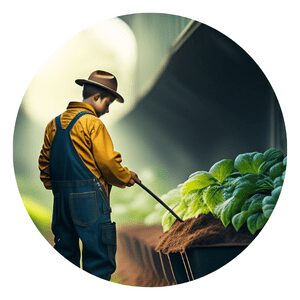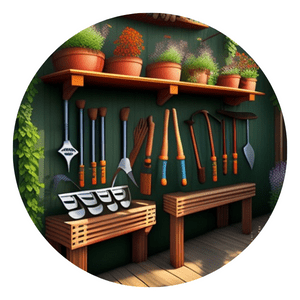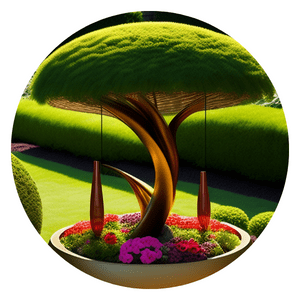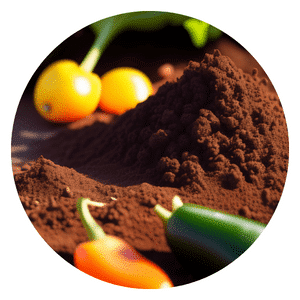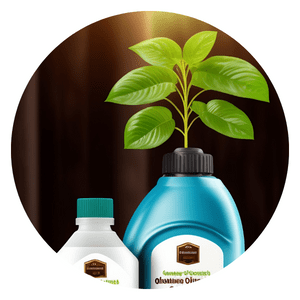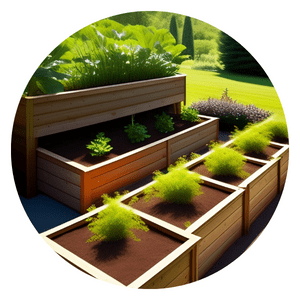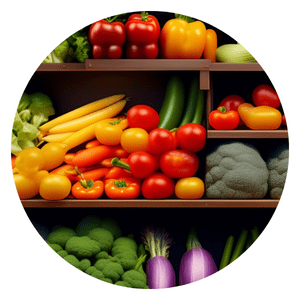How To Use Organic Fertilizers On Potted Plants?
Have you ever wondered how to give your potted plants the best care possible?
If so, you’re in luck! In this article, we’ll dive into the world of organic fertilizers and discover how they can revolutionize your plant’s growth.
Say goodbye to synthetic chemicals and hello to natural goodness that will not only benefit your plants but also the environment.
Whether you’re a seasoned gardener or just starting out, this guide will provide you with all the necessary information to effectively use organic fertilizers on your potted plants and watch them thrive like never before.
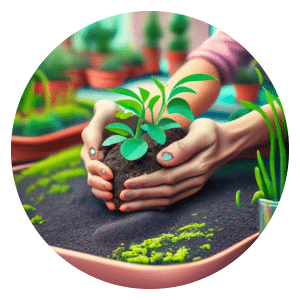
Organic Fertilizers On Potted Plants
Choose the Right Organic Fertilizer
When it comes to choosing the right organic fertilizer for your potted plants, it’s important to consider their specific needs. One common option is compost, which provides a rich source of nutrients and improves soil structure.
Compost can be made at home using kitchen scraps, yard waste, and other organic materials. This not only reduces waste but also ensures that you have a natural and effective fertilizer on hand.
Another popular choice is worm castings or vermicompost. These are created by feeding organic material to earthworms, who then break it down into nutrient-rich castings. Worm castings are known for their high levels of beneficial microbes that help plants absorb nutrients more efficiently.
For those looking for a convenient option, liquid seaweed extract is a great choice.
Derived from kelp or seaweed, this organic fertilizer contains essential micronutrients like potassium and nitrogen. It also enhances root development and helps plants tolerate environmental stressors such as drought or heat.
No matter which organic fertilizer you choose for your potted plants, always ensure that you follow the recommended application rates to avoid over-fertilization.
Remember that each plant has its own unique requirements and preferences so adapt accordingly.
By selecting the right organic fertilizer for your potted plants, you can provide them with the nourishment they need while promoting sustainable gardening practices at the same time.
Apply During the Growing Season
During the growing season, plants are actively taking in nutrients from the soil to support their growth and development. This is the perfect time to apply organic fertilizers to help them thrive.
By applying these natural fertilizers during this period, you can ensure that your plants have a steady supply of vital nutrients to fuel their growth.
One reason why it is important to avoid fertilizing during the dormant or winter months is because plants are not actively growing during this time.
Fertilizing when they are dormant can actually do more harm than good, as it may encourage new growth that is vulnerable to frost and other environmental stressors.
Instead, save your organic fertilizer applications for when plants are in their active growing phase.
Another benefit of applying organic fertilizers during the growing season is that it allows you to observe and respond quickly to any nutrient deficiencies or imbalances in your potted plants.
Organic fertilizers release nutrients slowly over time, providing a continuous supply of essential elements for plant health.
By monitoring your plants closely during this period, you can adjust your fertilizer application as needed to optimize their growth and overall wellbeing.
Water the Plant
Watering your potted plant before applying fertilizer is a crucial step that many plant owners often overlook.
By thoroughly hydrating the soil, you not only prevent root burn but also create an optimal environment for the fertilizer to work its magic.
When the soil is dry, it can absorb nutrients more effectively and allow them to be distributed evenly throughout the plant.
Moreover, watering your plants beforehand helps in dissolving the fertilizer granules, ensuring that they penetrate deep into the root system rather than staying on the surface. This allows for better absorption and utilization of nutrients by the plant.
Think of it as preparing a nutrient-rich cocktail for your green companions – a well-hydrated soil acts as a carrier that delivers all the essential elements directly to where they are needed most.
In pots, where greenery takes its place, Organic nourishment we embrace. Choose compost or worm castings, so fine, To feed plants, with love so benign. Apply a little, not in excess, Deeply water, let growth impress. With time and care, your plants shall bloom, Sustainable beauty to fill the room.
Chappy The Gardener
Top-Dressing (Granular Fertilizer)
Top-dressing with granular fertilizer is a popular method used by many potted plant enthusiasts to provide their green friends with a steady supply of nutrients.
It involves sprinkling the recommended amount of granules evenly over the top layer of potting soil.
However, it is crucial to exercise caution and avoid direct contact between the plants’ roots and the fertilizer particles.
One way to achieve this is by gently scratching or lightly blending the fertilizer into the topsoil after application. This ensures that there won’t be any accidental burn from concentrated particles sitting on delicate root systems. Additionally, it allows for better distribution throughout the pot, increasing overall nutrient availability.
Another benefit of top-dressing with granular fertilizers is that it provides a slow-release source of nutrition for your potted plants.
The nutrients in these organic formulations are gradually broken down and released over time, allowing for continuous feeding without overwhelming your plants with an immediate surge in nutrients. This controlled release mechanism promotes healthier growth while reducing the risk of nutrient leaching or wastage from excessive watering.
Incorporate (Granular Fertilizer)
When it comes to feeding our potted plants, there are two main options: liquid fertilizers and granular fertilizers.
While liquid fertilizers provide instant nourishment, granular fertilizer offers a slow-release option that can be more beneficial for long-term plant growth.
Incorporating the granular fertilizer into the top layer of soil is an essential step to ensure that your plants receive all the nutrients they need.
By gently scratching the granular fertilizer into the top layer of soil using a small hand trowel or fork, you are ensuring that the nutrients are within reach of the plant’s roots. This method allows for better absorption and utilization of nutrients, as they become readily available to nourish your plants over time.
The gentle scratching action also helps to aerate the soil, promoting healthy root development and preventing waterlogging.
Another advantage of incorporating granular fertilizer is its ability to create a balanced nutrient profile throughout the root zone.
Unlike liquid fertilizers that can sometimes lead to imbalances if not properly mixed or used in excess, granular fertilizers release their nutrients slowly and evenly over time. This ensures that each plant receives a consistent supply of essential elements without any risk of nutrient overload or deficiency.
Furthermore, this slow-release feature means less frequent application compared to liquid alternatives, reducing maintenance efforts while still providing long-lasting nourishment for your potted plants.
Dilute (Liquid Fertilizer)
When it comes to using liquid organic fertilizer on potted plants, dilution is key.
Following the package instructions for dilution is essential as this ensures that you are applying the correct concentration of nutrients.
Over-fertilizing can lead to nutrient burn and damage to your plants, so it’s crucial to take the time to measure and mix accordingly.
Using a watering can or hose-end sprayer is an effective way to apply diluted liquid fertilizer directly to your potted plants. This method allows for easy and even distribution, ensuring that all areas of the soil receive the necessary nutrients.
It’s important not to overwater during this process; merely moistening the soil with the diluted solution is sufficient.
Monitor Plant Response
One of the key benefits of using organic fertilizers on potted plants is that they provide nutrients in a slow-release form, allowing for better absorption and utilization by the plants.
However, it’s important to keep a close eye on your plants for any signs of nutrient deficiencies or excesses.
Yellowing leaves, stunted growth, or even nutrient toxicity can all be indicators that something is not quite right.
Monitoring your plants regularly will help you catch these issues early and take appropriate action.
If you notice yellowing leaves, for example, it may indicate a lack of nitrogen in the soil. In this case, adding an organic fertilizer with a higher nitrogen content could be beneficial.
On the other hand, if you see signs of stunted growth or leaf burn, it might suggest an excess of nutrients. Adjusting your fertilizer application accordingly can help prevent further damage and promote healthy plant growth.
By paying close attention to your potted plants and monitoring their responses to organic fertilizers, you’ll be able to fine-tune your feeding routine and ensure optimal nutrient uptake. This hands-on approach not only allows you to address any potential problems promptly but also helps you develop a deeper understanding of your plant’s unique needs.
Remember, while organic fertilizers are great for providing long-term nourishment to potted plants in a natural way, keeping an eye on their response is essential for maintaining their overall health and well-bein
Balance Nutrient Needs
It is crucial to find the right balance of nutrients for your potted plants in order to ensure their optimal growth and health.
Different types of plants have varying nutrient requirements, so it is essential to choose a fertilizer that meets those specific needs.
While some plants may benefit from balanced fertilizers, providing equal amounts of nitrogen, phosphorus, and potassium, others may require specialized fertilizers that are high in certain nutrients.
Understanding the nutrient needs of your plants will help you choose the most appropriate organic fertilizer. For instance, flowering plants often require higher levels of phosphorus for robust blooming and fruiting.
On the other hand, leafy green vegetables like lettuce or spinach benefit from more nitrogen-rich fertilizers to promote healthy leaf development.
While there are many all-purpose organic fertilizers available on the market, it is important to remember that each plant has unique nutrient requirements.
By selecting the right fertilizer for each type of potted plant you own, you can provide them with the nutrients they need to thrive and flourish.
Take some time to research and understand the individual preferences of your plants before making your fertilizer selection – they will thank you with bountiful growth and vibrant colors!
Rotate Fertilizers
By using a variety of organic fertilizers, you can provide your potted plants with a wide range of essential nutrients.
Each type of fertilizer has its own unique blend of nutrients, so rotating them ensures your plants get all the necessary elements for healthy growth.
For example, one fertilizer might be high in nitrogen for leafy growth, while another is rich in phosphorus and potassium for root development and flowering.
By alternating these fertilizers throughout the growing season, you can address any potential deficiencies and create an optimal balance for your plants’ overall health.
Furthermore, rotating fertilizers can also help prevent nutrient buildup or excesses in the soil over time.
Some organic fertilizers release their nutrients slowly over several weeks or months, while others break down quickly and are absorbed rapidly by the plant roots.
By alternating between slow-release and quick-release fertilizers, you can avoid overwhelming your plants with excessive nutrients that could potentially harm them or disrupt their natural growth cycles.
Soil Testing
Soil testing is a crucial step in ensuring the health and growth of your potted plants. By periodically testing the soil, you can gain valuable insights into its nutrient levels and pH, which are essential factors for plant development.
Nutrient deficiencies or imbalances can lead to stunted growth, yellowing leaves, or even plant death. pH levels also influence how effectively plants can absorb nutrients from the soil.
By knowing the specific needs of each plant through soil testing, you can tailor your fertilization approach to provide exactly what they require.
Not all plants have the same nutrient requirements or pH preferences. This is where soil testing becomes invaluable in guiding your fertilization choices. It allows you to make informed decisions about which organic fertilizers will best suit your potted plants’ needs.
For example, if you discover that a certain plant has low nitrogen levels, choosing an organic fertilizer with higher nitrogen content will help address this deficiency effectively.
Similarly, if the pH is too high for a particular plant’s liking, selecting an organic fertilizer with acidic properties will help adjust it and create a more conducive environment for optimal growth.
In conclusion, using organic fertilizers on potted plants is a great way to promote healthy growth and provide essential nutrients without the use of harmful chemicals.
By choosing organic options such as compost, worm castings, and seaweed extract, you can ensure that your plants are receiving all the necessary elements for optimal growth.
It is important to follow the recommended application rates and frequency to avoid over-fertilizing and causing harm to your plants.
Additionally, regularly monitoring the soil moisture levels and adjusting watering practices accordingly will help maximize the effectiveness of organic fertilizers.
So why wait? Start incorporating organic fertilizers into your potted plant care routine today for vibrant, thriving plants that will impress everyone who sees them.
Click To Grow
Helps Us Grow – Share If You Like


